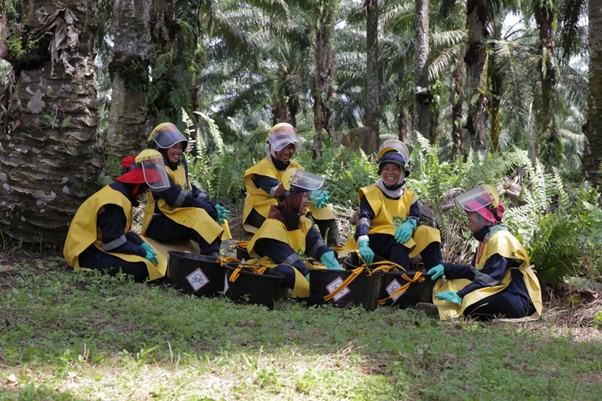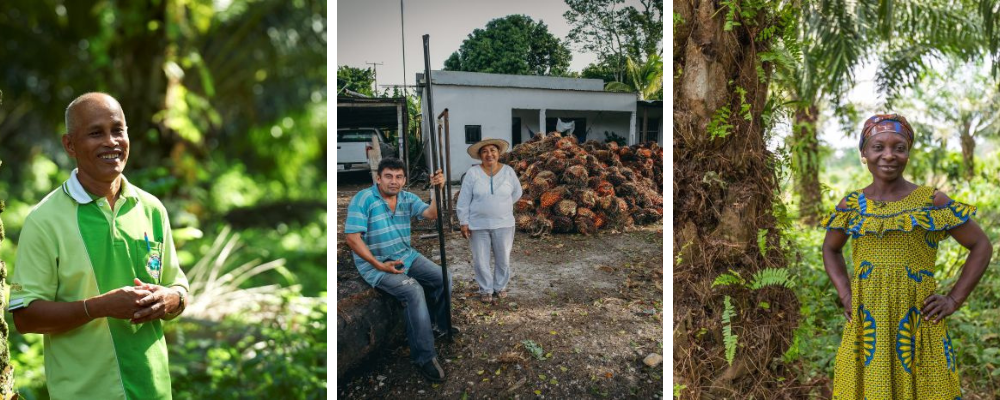Editor’s note: In celebration of Earth Day, we are pleased to debut a new “Guest Insights” column, where we invite various experts and specialists across the sustainable palm oil value chain to share their insights on current developments shaping the sustainability landscape.
By: Dr. Bremen Yong
Group Chief Sustainability Officer of PT REA KALTIM PLANTATIONS, Dr. Bremen Yong spotlights the increasing challenges smallholders face amid stricter legislative frameworks worldwide, and the “outside-in” community-first approach of the SHINES programme to advance smallholder inclusion in sustainable palm oil.

On a sunny day in June 2024, overlooking the panoramic view of the iconic Merlion statue in Singapore, I met with two senior executives from prominent global brands at their Singaporean office. The setting was pleasant, but our conversation centred on a serious concern: the risk of excluding smallholders from supply chains due to their difficulty in complying with increasingly complex regulations, including the European Union Deforestation Regulation (EUDR), which back then was set to take effect in December 2024.
There was a shared understanding that the future of sustainable palm oil must be inclusive. It calls for collective responsibility – where both upstream and downstream players work together to support, not sideline, smallholders. That conversation sparked genuine interest in collaboration, and just a few months later, REA launched the SmallHolder Inclusion for Ethical Sourcing (SHINES) Programme on 10 October 2024, partnering with several companies across the supply chain.
From conversation to action
Together with Daemeter as our programme partner, SHINES has become a central platform for advancing smallholder inclusion in sustainable palm oil. Building on our foundation of 100% RSPO Certified mills, REA upgraded its internal due diligence mechanism, established a robust traceability system, invested in infrastructure for segregation of fresh fruit bunches at the Cakra Palm Oil Mill, and partnered with Koltiva for polygon mapping of our third-party suppliers. These innovations enabled the mill to be among the first to be independently verified as EUDR-ready as of August 2024, despite operating under mass balance certification.
We then turned our attention to smallholders. Through SHINES, we signed Letter of Intent with three global brands (RSPO Members) and Memorandums of Understanding with five cooperatives (Koperasi Perkebunan Belayan Sejahtera, Koperasi Perkebunan Gotong-Royong, Koperasi Perkebunan Tunas Harapan, Koperasi Perkebunan Bina Wana Sejahtera and Koperasi Karya Penoon) near our operations, engaged local farmers, and collected 735 polygon maps via our REA-Koltiva collaboration. We also supported 67 independent smallholders (ISH), of which 25 ISHs have successfully obtained their Surat Tanda Daftar Budidaya (STD-B), a document crucial for verifying the legality of cultivation and meeting market requirements.
The interest has been encouraging. For many smallholders, this programme presents an opportunity to boost income through a double incentive, either by selling RSPO Certified fresh fruit bunches directly to REA or by trading RSPO Credits via RSPO’s prisma platform, plus a potential premium from EU buyers seeking deforestation-free, traceable supply chains.
Why smallholders matter

After many years in the palm oil sector, I’ve witnessed its evolution – one that is marked by progress, but also persistent gaps. Palm oil remains under scrutiny, but I believe it holds immense potential to be a force for good. With sustained effort, partnerships, and responsible practices, the pathway to sustainable production is clear and essential.
Today, global expectations have shifted. Stricter regulations and increasing demands for transparency are reshaping the landscape. Among the biggest challenges is ensuring that smallholders, who contribute nearly 40% of Indonesia’s palm oil, aren’t left behind.
Many face hurdles in accessing markets, securing fair pricing, and navigating complex compliance systems. Our responsibility is not just to include them, but to create the conditions in which they can succeed.
Navigating field complexities
One thing I’ve learned is that meaningful change starts with constructive dialogues to listen and form partnerships. Many smallholders operate outside formal systems and are unfamiliar with sustainability frameworks or certification processes. That’s where SHINES comes in, not as a one-size-fits-all solution, but as a collaborative, scalable, and commercially viable model that benefits all parties involved.
Instead of pushing from the top down, we built SHINES around four practical goals, namely, enabling smallholders to achieve compliance with RSPO and EUDR standards, conserving forests outside our concessions, improving livelihoods in six target villages, and strengthening traceability across the supply chain.
When farmers see tangible benefits, such as legal recognition, higher income, or access to better markets, they’re eager to participate. And when we meet them halfway with trust and transparency, progress becomes possible.
While still in its early stages, the SHINES programme was designed with pragmatism and scalability in mind. Its “outside-in” community-first approach, supported by tools like land mapping, capacity-building, and incentive mechanisms, offers a strong foundation that could be adapted to other regions and supply chains.
Looking ahead
The path forward will bring challenges, but also opportunity. Evolving standards and regulations like the EUDR are raising expectations, and rightly so. At the same time, these shifts give us the momentum to rethink how sustainability can be implemented in ways that are inclusive and practical in driving positive changes. We believe this is the right path – through Shared Responsibility, we promote sustainable palm oil production and create lasting value for stakeholders.
Together, let’s Cultivate Tomorrow, Today.
To learn more and follow the SHINES journey, go to REA’s LinkedIn page or explore RSPO’s smallholder initiatives
Keep reading

Book Your Slot for the Additional prisma Clinic Session at RT2025

Advancing Jurisdictional Certification in Sabah: Strengthening Collaboration Between RSPO, UNDP, and Jurisdictional Approach System for Palm Oil (JASPO)
Call for Expression of Interest: Independent Investigation of a Complaint

Leading Labels: RSPO Among Top Sustainability Labels in Dutch Market

The 21st International Oil Palm Conference Successfully Took Place in Cartagena, Colombia

Top Performers of the 2025 Shared Responsibility Scorecard

ACOP 2024: RSPO Market Trends Resilient Despite Global Challenges

RSPO: Actions for the Certification of Sustainable Palm Oil Production




